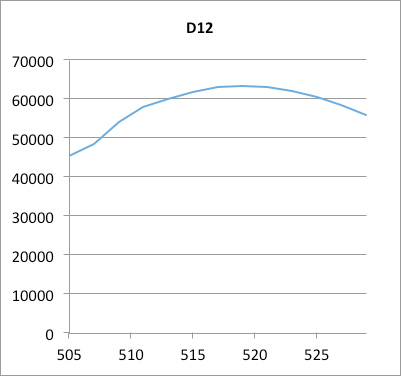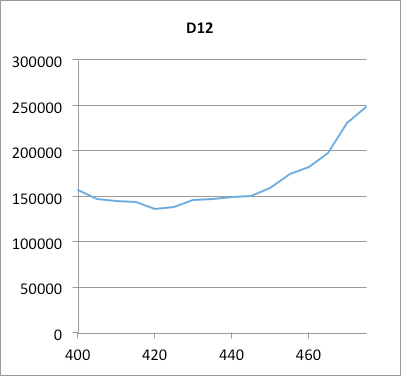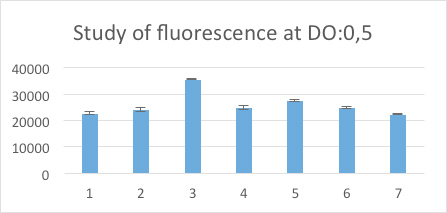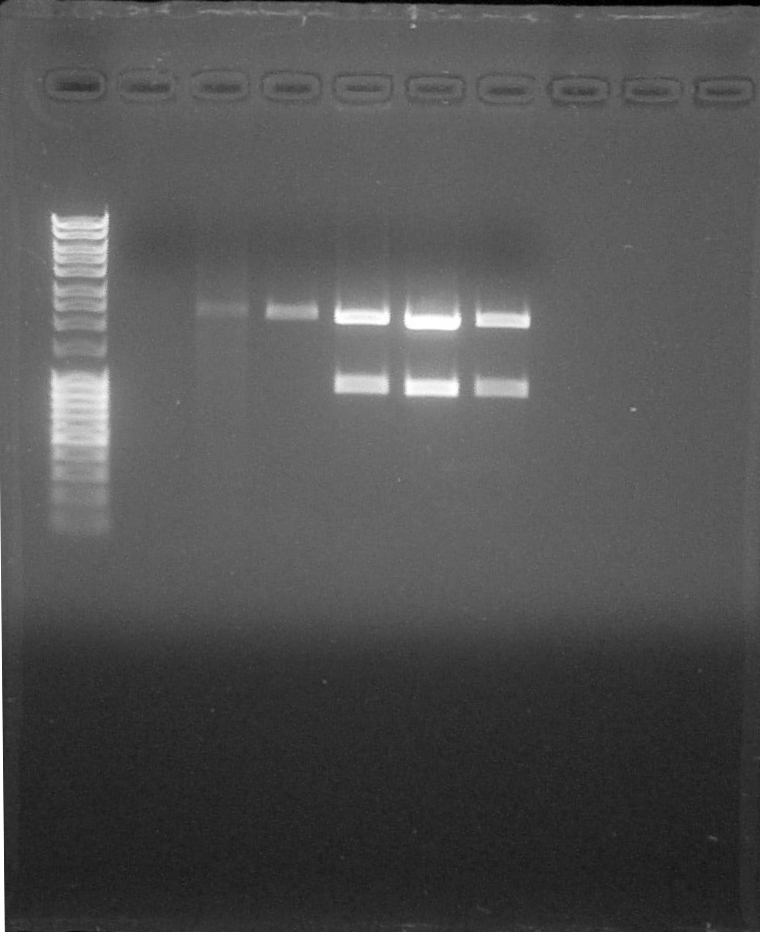Difference between revisions of "Team:Paris Saclay/Measurement"
(→Tecan utilisation:) |
(→Tecan utilisation:) |
||
| Line 199: | Line 199: | ||
New culture of BBa_J23101/BBa_J23106/BBa_J23117 + BBa_I13504 | New culture of BBa_J23101/BBa_J23106/BBa_J23117 + BBa_I13504 | ||
=====Tecan utilisation:===== | =====Tecan utilisation:===== | ||
| − | + | We use only LB without chloramphenicol and we suspect a contamination of our samples. | |
| − | We depose in | + | We depose in each well 300µL. |
| − | We analyse the OD and fluorescence's variation (the excitation and emission wave lenght were | + | We analyse the OD and fluorescence's variation (the excitation and emission wave lenght were choen after a scan in the process to obtain the best results). |
| − | For each sample, we depose twelve | + | For each sample, we depose twelve times (12x8 plate). |
*LB | *LB | ||
| Line 213: | Line 213: | ||
*Cells with J23117 + GFP | *Cells with J23117 + GFP | ||
| − | We let | + | We let it run for 20 cycles of 1 hour. |
====29th July==== | ====29th July==== | ||
Latest revision as of 21:45, 18 September 2015
Contents
Interlab study
Introduction
- [http://parts.igem.org/Part:BBa_J23101 BBa_J23101] + [http://parts.igem.org/Part:BBa_I13504 BBa_I13504]
- [http://parts.igem.org/Part:BBa_J23106 BBa_J23106] + [http://parts.igem.org/Part:BBa_I13504 BBa_I13504]
- [http://parts.igem.org/Part:BBa_J23117 BBa_J23117] + [http://parts.igem.org/Part:BBa_I13504 BBa_I13504]
were cloned in the reference plasmid: PSB1C3 at 7th July. Controls used are the same constructions, without the BBa_I13504.
Preparation of the constructions
All constructs used were transformed into DH5α strain at 16th July. First of all, we rehydrated the different BioBricks and transformed them into cells. After this step we used the standard assembly protocol to insert BBa_I13504 as suffix. The different DNA fragments containing promoters were cut with SpeI and PstI enzymes, and
Preview
After taking our different colonies from the LB plate, we put them on UV lamp. The construction with BBa_J23101 had the strongest fluorescence, but the construction with BBa_J23117 showed the same fluorescence as the control.
Our bacteria were put in 5mL LB in 25mL glass tube. Kept at 37°C over night with 150rpm (position with angle in Unitron INFORS HT Incubation Shakers. In the morning we dilute our samples to obtain a 0,1 DO (it takes one hour to pass all the controls in the cytometer). For the first test, it appeared that bacteria cultures were overgrown, and we observed two times the DO max so we obtained a duplicate of our sample.
Protocols
Measuring
In first place we used a flux cytometer PARTEC Cyflow CUBE 6 All the controls correspond to the exact constructions without BBa_I13504. The dark color curves correspond to the controls, the light ones to the constructions tested. The blue one corresponds with the other blue and the green with the other.
23rd July: The different samples were analyzed at DO max.
30th July: We tested another biological replicate, with DO:0.6 and DOmax. The black picks are LB tests.
We observe that promoter BBa_J23101 allows a 10 fold induction of fluorescence compared to BBa_J23106. Moreover J23117 has a curve response comparable to the control.
TECAN infinite 200 Pro multimode reader
Test to obtain the best excitation/emission
We observed with flow cytometry results that the maximum of fluorescence is obtained with BBa_J23101+GFP in stationary phase, we used these conditions to setup the experiment.
Excitation 465nm to obtain the best emission wavelength
We fixed the emission wavelength at 520nm and process to obtain the best excitation wavelength
Fluorescence Top Reading
- 460 Nm*
- 520 Nm*
- 9 nm
- 20 nm
- 100 Manual
- 25
- 20 µs
- 0 µs
- 0 ms
Absorbance
- 600 nm
- 9 nm
- 25
- 0 ms
OD600#0,5 (between 0,4 and 0,55) 300 µl of each sample were taken out and put on a 96-well plate (flat transparent bottom, black wall) to measure fluorescence.
Caption:
- LB
- BBa_J23101
- BBa_J23101 + BBa_I13504
- BBa_J23106
- BBa_J23106 + BBa_I13504
- BBa_J23117
- BBa_J23117 + BBa_I13504
We observe a peak of fluorescence with BBa_J23101+BBa_I13504, and a lesser one with BBa_J23106+BBa_I13504. But with the last one BBa_J23117+BBa_I13504 we observe a result similar to the negative control.
Results
We see that the construct BBa_J23101 is the strongest of our 3 promoters. BBa_J23106 showed the lowest fold induction response, and the BBa_J23117 showed the same response as the different controls. And this result was obtained with the two different methods (flux cytometer and microplate reader). When the electrophoresis was done, we saw that the construct J23117+I13504 was inserted in pSB1C3, but it appeared that the activity of this promoter was really low or null.
Notebook
1st July
Rehydratation:
- BBa_I13504
- BBa_J23117
- BBa_J23106
- BBa_J23101
2nd July
Transformation:
- BBa_I13504
- BBa_J23117
- BBa_J23106
- BBa_J23101
3rd July
Liquide culture:
- BBa_I13504
- BBa_J23117
- BBa_J23106
- BBa_J23101
8th July
First Digestion:
- BBa_J23101
- BBa_J23106
- BBa_J23117
Mix:
- 10µL of our plasmid with promotor
- 1µL SpeI
- 1µL PstI
- 2µL buffer 10x FastDigest
- 6µL H2O
Second Digestion:
- BBa_I13504
Mix:
- 10µL of our plasmid with gene
- 1µL XbaI
- 1µL PstI
- 2µL buffer 10x FastDigest
Incubation 1h30, 37°C
9th July
Transformation:
- BBa_J23101 + BBa_I13504
- BBa_J23106 + BBa_I13504
- BBa_J23117 + BBa_I13504
On LB + Chloramphenicol 20ug/mL. Incubation ON, 37°C
15th July
Liquid culture:
- BBa_J23101 + BBa_I13504
- BBa_J23106 + BBa_I13504
- BBa_J23117 + BBa_I13504
We can observe from the plate that BBa_J23101 + BBa_I13504 and BBa_J23106 + BBa_I13504 are yellow when we expose them to the UV light. But BBa_J23117 + BBa_I13504 don't seem to be yellow on the UV light.
16th July
Digestion:
- BBa_J23101 + BBa_I13504
- BBa_J23106 + BBa_I13504
- BBa_J23117 + BBa_I13504
Reaction mix:
- Plasmid: 2µL
- EcoRI: 0,5µL
- PstI: 0,5µL
- Buffer FastDigest (10x): 2µL
- H2O: 15µL
Electrophoresis:
- Ladder
- BBa_R0051 (07/15/2015)
- BBa_R0051 (07/16/2015)
- BBa_B0030
- BBa_J23101 + BBa_I13504
- BBa_J23106 + BBa_I13504
- BBa_J23117 + BBa_I13504
Preparation of Agarose Gel 1%, 0,5g in 50mL of 1X TAE, 0,5µL of BET Migration 0,06A 80V
17th July
New culture on Plate
- BBa_J23101 + BBa_I13504
- BBa_J23106 + BBa_I13504
- BBa_J23117 + BBa_I13504
23rd July
Liquid culture from the 3 stocks
24th July
Cytometer
We count 500 000 events Controls:
- E. coli Cells without plasmid
- Transformed cells by BBa_J23101, BBa_J23106 and BBa_J23117
Our measurements: Transformed cells by
- BBa_J23101 + BBa_I13504
- BBa_J23106 + BBa_I13504
- BBa_J23117 + BBa_I13504
We uses cells in growth phase and stationary phase
Between each test, we do 2 washes with bleach and 2 washes with H2O
28th July
New culture of BBa_J23101/BBa_J23106/BBa_J23117 + BBa_I13504
Tecan utilisation:
We use only LB without chloramphenicol and we suspect a contamination of our samples. We depose in each well 300µL. We analyse the OD and fluorescence's variation (the excitation and emission wave lenght were choen after a scan in the process to obtain the best results). For each sample, we depose twelve times (12x8 plate).
- LB
- Competent cells
- Cells with J23101
- Cells with J23101 + GFP
- Cells with J23106
- Cells with J23106 + GFP
- Cells with J23117
- Cells with J23117 + GFP
We let it run for 20 cycles of 1 hour.
29th July
Tecan utilisation:
This time, we use LB and chloramphenicol because the plate has just a protection and we suspect a contamination of our samples. We depose in each well 300µL. We analyse the OD and fluorescence's variations (the excitation and emission wave lenght were chosen after a scan in the process to obtain the best results).
For each sample we use 3 different colonies, we depose 2 times each colonies (12x8 plate).
- LB
- Competent cells
- Cells with J23101
- Cells with J23101 + GFP
- Cells with J23106
- Cells with J23106 + GFP
- Cells with J23117
- Cells with J23117 + GFP
We let it run for 20 cycles of 1 hour each.
Flow cytometer
We analyse the sample see previously with ODmax and OD 0.4 But we doesn't use the good scale so we will reused it tomorrow
30th July
Flow cytometer
We count 500 000 events Controls:
- LB
- Transformed cells by BBa_J23101, BBa_J23106 and BBa_J23117
Our measurements: Cells transformed by
- BBa_J23101 + BBa_I13504
- BBa_J23106 + BBa_I13504
- BBa_J23117 + BBa_I13504
We uses cells in growth phase and stationary phase
Between each test, we do 2 washes with bleach and 2 washes with H2O
We use a less powerful adjustment to see tall the result than the day before.






